BCCi's first homes in French speaking Africa were in Ivory Coast (Cote d’Ivoire) and Gabon. Operations in both countries started in 1978, and in many ways, they reflected BCCi’s growing commitment to the least developed countries in the Third World.
The name "Ivory Coast" suggested the major trade that occurred on that particular stretch of the west coast of Africa was the export of ivory.
Country information
Ivory Coast, formally Côte d'Ivoire, officially the Republic of Côte d'Ivoire, is a country located on the south coast of West Africa.
The country borders Guinea to the northwest, Liberia to the west, Mali to the northwest, Burkina Faso to the northeast, Ghana to the east, and the Gulf of Guinea (Atlantic Ocean) to the south.

History
The first human presence in Ivory Coast dated back thousands of years. The first recorded history appears in the chronicles of North African (Berber) traders, who, from early Roman times, conducted a caravan trade across the Sahara desert.
The early European merchant explorers were from Portugal and France in the 15th and 16th centuries. The area became a protectorate of France in 1843 and was consolidated as a French colony in 1893.
France's main goal was to stimulate the production of exports. Coffee, cocoa, and palm oil crops were soon planted along the coast.

In 1946 the Ivory Coast became an overseas territory of France with its parliament and representation in the French national assembly. On December 4, 1958, the Ivory Coast became an autonomous republic within the French Community.
Ivory Coast achieved full independence from France on 7 August 1960.
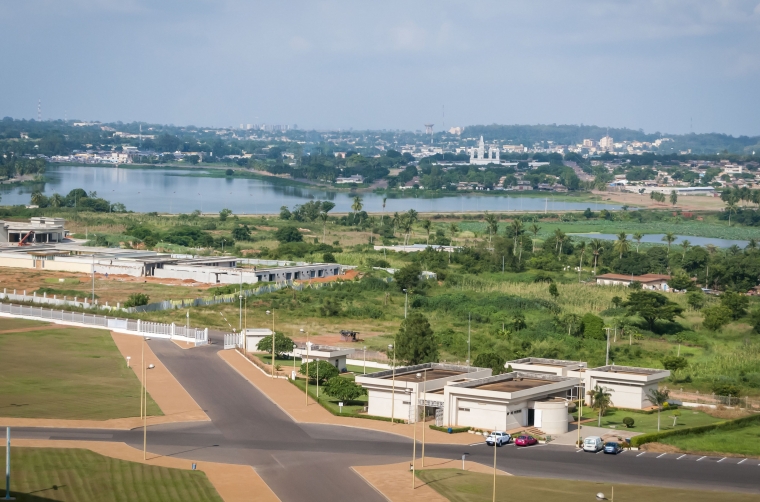
Ivory Coast's political and administrative capital was Yamoussoukro in the centre of the country, while its economic capital and largest city was the port city of Abidjan, one of the many trading ports built by Europeans along the African coast.
.jpg)
Along with seven other French speaking countries, the currency of Ivory Coast is the CFA franc, with a common central bank, the Central Bank of West African States (BCEAO).

The official headquarters of the African Development Bank (AfDB or ADB) or Banque Africaine de Développement (BAD), official headquarters is in Abidjan, the capital of Ivory Coast. It was established in 1964 with the objective of supporting the economic development and social progress of countries in Africa by promoting investment of public and private capital in projects and programmes that aim to reduce poverty and improve living conditions.
Population and language
In the 1980s the population of the country was around 8.5 million.
The official language was French.
Economy

Agriculture provided a livelihood for more than half the labour force, and locally grown subsistence crops met most rural domestic needs. Urbanisation created a demand for imported foodstuffs and an acquired taste for bread and beer led to significant imports of wheat. Other important imports were machinery, motor vehicles and crude oil.
Cocoa beans was the main export crop, cultivated by more than 25% of the population, and by the late 1980s, after overtaking Ghana in cocoa bean exports, Ivory Coast became the world’s leading cocoa bean producer. Other important exports were coffee and timber.
BCCI in Ivory Coast
BCCI had two branches in the Ivory Coast (Cote D'Ivorie).
Abidjan
BCC opened its first branch in 1978 in Abidjan, the economic capital of Ivory Coast.
Abidjan branch was located at:
Residence Le Jeceda
Boulevard de la Republique
01 B.P 1397, Abidjan 01 Plateau
Telephone: (225) 215410
Fax: (225) 215243
Telex: 22444 BANCROMCI / 22588 BANCROMCI
All the leading French colonial banks and US banks were present, along with an English bank and one from Brazil. In total there were 16 banks and 30 financial institutions in Ivory Coast at the time.
Abidjan was a large metropolitan city and economic capital, and home many of the 50,000 Frenchmen living there. About two million non-lvorian Africans and Lebanese were also working and, in the country, when BCC Abidjan branch opened.
Many French and Lebanese companies involved with exports, imports and oil exploration had their headquarters in Abidjan which was also the country’s main seaport.
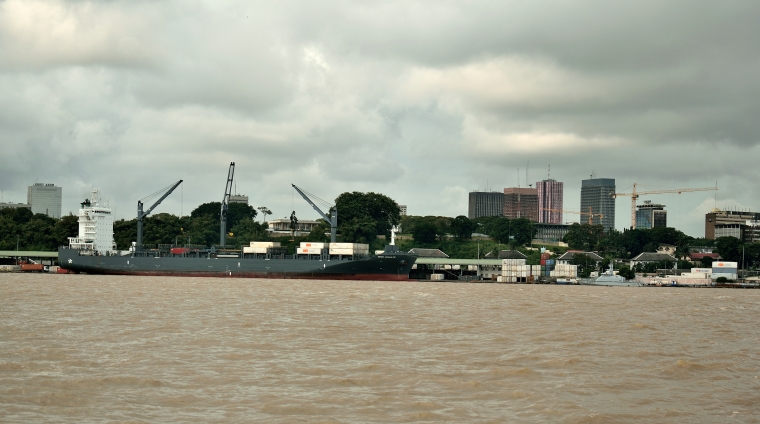
Apart from providing banking services to retail customers and mobilising deposits, Abidjan branch was active in financing foreign trade for business customers. During the 1970s, when commodity prices on the world market were high, Ivory Coast was not short of export earnings from coffee and cocoa, the country’s main crops.

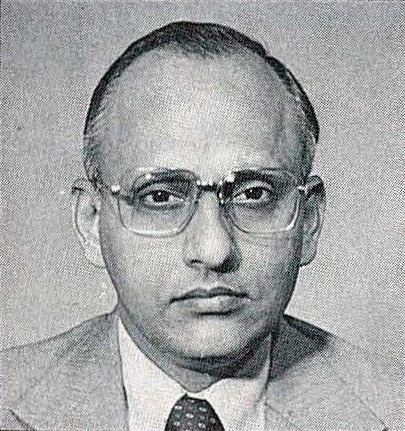
BCC Abidjan branch share of the market grew steadily and covered all sectors of imports and exports and they worked increasingly with corporate clients and government agencies.
For example, 50% of all rice imports in the 1980s were handled by BCC. These came from Burma, Thailand and Pakistan. Although Ivory Coast was virtually self-sufficient in oil, a good deal of oil was still imported because of export agreements, and BCC was very active in this sector.
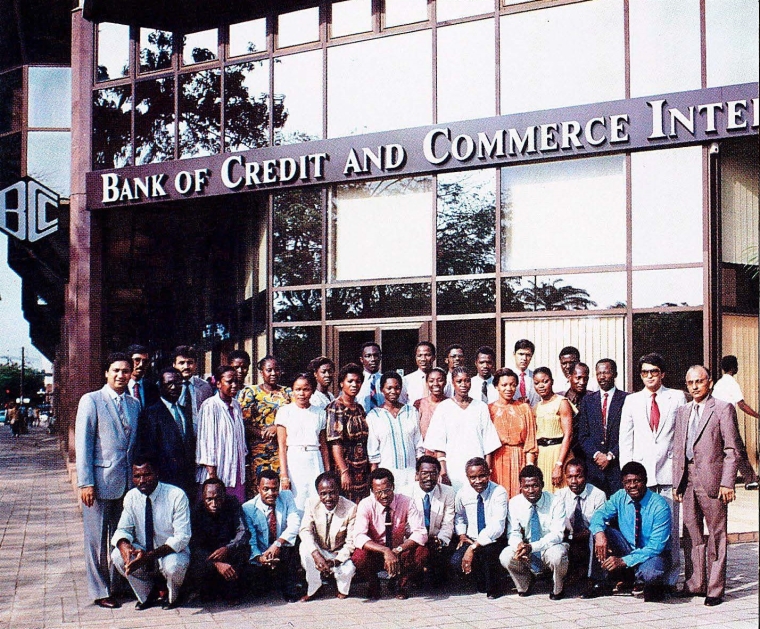
BCC Abidjan expanding business in foreign trade relied on the services of BCC branches outside the country, and BCC dealing rooms in Paris and Luxemburg. The branch regularly dealt in foreign exchange and commodities in Geneva, in Paris, Luxemburg and London.
In terms of profitability, BCC was one of the largest foreign banks in Ivory Coast in 1983. This encouraged BCC to plan a second branch at Vridi, Abidjan's industrial and port area.
Training for BCC in West Africa
BCC's role in developing and handling business was enhanced by the new training centre established in Abidjan, in the same building as the branch. The centre ran courses and in addition provided professional training to complement on-the-job training for existing staff and new employees in BCC branches in French-speaking in Africa .
Vridi
Vridi is a town in the neighbourhood of Abidjan located in the industrial and port area of Abidjan.
It was important to Abidjan because of the Vridi Canal, a navigable canal that was constructed in 1950 connecting the port of Abidjan to the Atlantic Ocean. This made Abidjan the major shipping and financial centre of French-speaking West Africa.
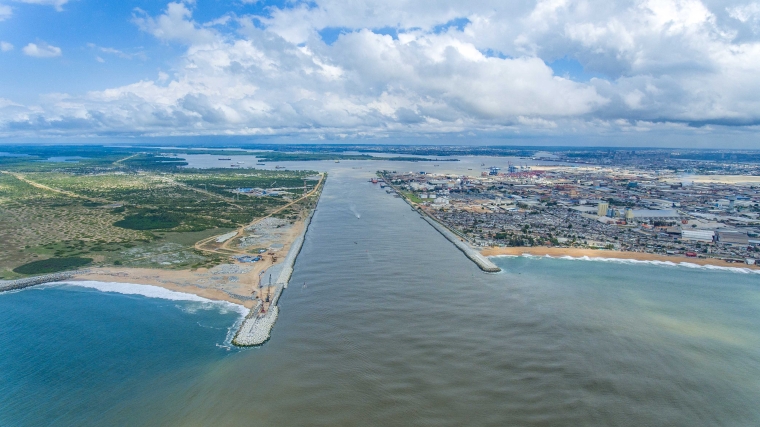
BCC branch in Vridi was opened in April 1981 with seven staff from BCC Abidjan.
Vridi branch was located at:
Boulevard de Veridi
Nouvelle Zone Industrielle
15 B. P. 1129
Abidjan 15
Telephone: (225) 350368 / 350371
Fax: (225) 353637
Telex: 42418 BCCVRDCI
BCC in Abidjan already had clients in Vridi to whom the new branch provided more immediate service. It also provided the foundation for further expansion of BCC’s business in Ivory Coast.
BCCI closure
On 5 July 1991 the Bank of England and other regulators in the west decided to freeze BCCI Group's assets and abruptly shut down BCCI's operations worldwide.
The priority of the governments and central banks in some countries was to protect their people and the local operations of BCCI continued in a different name after the assets and liabilities were acquired by private investors or another bank.
"The central bank of the Monetary Union of West African States announced last week that BCCI branches in Niger, Togo, Senegal and Ivory Coast were financially sound and would reopen soon." (apnews abidjan: 1 August 1991).
BCCI branches in Ivory Coast (Cote D'Ivoire) were closed from 8 July 1991 and under the joint control with the Central Bank. The Liquidators of BCCI were reportedly in negotiations to sell the branches of BCCI in Ivory Coast, including those in Senegal, Togo and Niger. No further information is available on the status of BCCI operations in Ivory Coast.
The BCCI Group majority shareholders considered the abrupt action by western central banks to shut down BCCI in 1991 was unjustified when they already had detailed discussions with the Bank of England and other regulators on a restructuring plan and would have injected further capital, if required.
In a 24-page report not made public but sent to some 60 central bankers worldwide, the United Nations Center on Transnational Corporations said that by simply shutting down the 70-nation banking network that financed international trade of $18 billion a year, the economic damage fell hardest on countries like Nigeria, Bangladesh and Zambia, where B.C.C.I. was an important institution. (New York Times, Feb 5, 1992)
Also read:
Acknowledgment:
- In-house magazine
